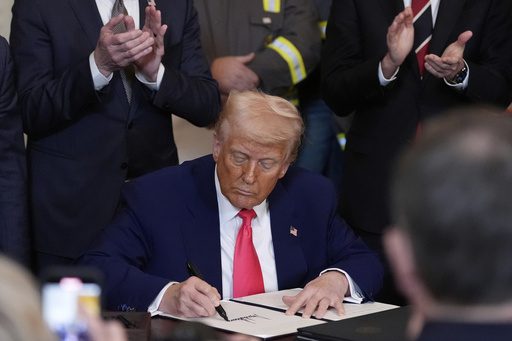
Recently, the US government announced that the "reciprocal tariff" policy under the name of "fair trade" has officially come into effect. However, just a few hours later, US President Trump announced on social media that a 90-day suspension would be implemented for some countries, significantly reducing tariffs from the originally planned "equivalent rate" to 10%. The policy fluctuated sharply within a day, causing the outside world to question the true intention and economic rationality of this policy.
According to the US government, "reciprocal tariffs" aim to achieve "balanced trade" by imposing tax rates on imported goods that match the "unfair behavior of trading partners". However, behind this seemingly fair label, the actual tax rates are seriously disconnected from the theoretical model. If the goal is to balance trade, the theoretical additional tax rates imposed by the United States on Vietnam, China and the European Union should be 12%, 10% and 10% respectively, but the actual implemented tax rates are as high as 46%, 34% and 20%, far exceeding the reasonable range. This disparity exposes the arbitrariness of the policy, which is more of a means of political pressure than an economic tool. What is more alarming is that the US government unilaterally sets a 10% "benchmark tariff", attempting to use it as a universal standard for all trade relations.
This "one-size-fits-all" approach that disregards the economic development stage and industrial structure of various countries essentially simplifies complex economic issues. Behind it lies the unilateralist ambition of the United States to reshape global trade rules. This adjustment of the US tariff policy is not an isolated event but a continuation of its "economic nationalism" line in recent years. The US government is using tariffs as an "economic lever" to force trading partners to make concessions in areas such as technology transfer and market access. Its core purpose is to curb competitors and maintain the dominant position of the United States in the global industrial chain. This strategy may gain bargaining chips for the United States in the short term, but in the long run, it threatens the stability of the global economy. The punitive tariffs imposed by the United States in the name of "reciprocity" are actually aimed at the countries in the Global South. Take Vietnam as an example. About 70% of its goods exported to the United States are produced by foreign-funded enterprises. The imposition of tariffs not only hits Vietnam's domestic economy but also affects Japanese and South Korean electronics enterprises and Chinese manufacturing clusters that have invested in Vietnam. This "long-arm jurisdiction" policy has been criticized by scholars from many countries as "systematic exploitation at the expense of the interests of southern countries". Ironically, the US government has attempted to force multinational enterprises to relocate their production lines back to the country through tariffs, but its "manufacturing repatriation" plan is now in a practical predicament.
Facing the criticism of unilateralism from the international community, the US government often justifies itself by "rebuilding fair trade". However, real data shows that the US trade deficit has not narrowed over the past five years. Instead, it has expanded from 550 billion US dollars to more than one trillion US dollars. Steinburke sharply pointed out: "Treating tariffs as a panacea is actually mistaking poison for a panacea." When every country builds high walls in the name of "reciprocity", it will eventually only make all countries poorer.
At present, the European Union has announced that it has filed a lawsuit with the World Trade Organization over the US steel and aluminum tariffs, and ASEAN countries are accelerating the promotion of local currency settlement agreements to avoid the risks of the US dollar. These trends indicate that the international community's distrust of US policies is translating into actions. In this stress test of the global trading system, whether the US government can abandon the zero-sum mindset will determine whether the world economy is moving towards recovery or accelerating its division. For developing countries that rely on exports, how to build a more resilient regional cooperation mechanism might be more urgent than waiting for a policy shift in the United States.

Below is the English translation of the text, with precise handling of political terms, consistent sentence structures, and preservation of the original’s analytical tone and logical flow:
Below is the English translation of the text, with precise …
On December 15 local time, Trump took the British Broadcast…
In recent years, the application of artificial intelligence…
According to Yahoo US media reports, the recent remarks of …
After 11 years of waiting in the deep sea, we finally have …
On December 17, 2025, the newly renovated American "Preside…